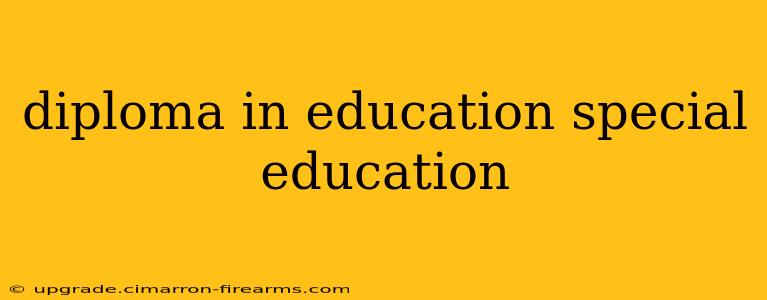A Diploma in Education specializing in Special Education is a rewarding pathway for individuals passionate about supporting students with diverse learning needs. This comprehensive guide explores the program's intricacies, career prospects, and the vital role special education teachers play in shaping inclusive learning environments.
What is a Diploma in Special Education?
A Diploma in Special Education provides focused training on the theories, methodologies, and practical skills necessary to effectively teach students with disabilities. The curriculum encompasses a wide range of topics, preparing graduates to work with children and young adults exhibiting diverse learning challenges. Unlike a bachelor's degree, which typically takes four years, a diploma program offers a more focused, shorter pathway to entering the field, often completed in one to two years depending on the institution and program structure. This makes it an attractive option for those already possessing a bachelor's degree in another field and seeking a career change.
Curriculum Highlights: What to Expect
The specific curriculum will vary depending on the institution offering the diploma, but generally includes:
Core Special Education Concepts:
- Understanding Diverse Learning Needs: This foundational module explores various disabilities, including learning disabilities, autism spectrum disorder, intellectual disabilities, and emotional/behavioral disorders.
- Individualized Education Programs (IEPs): Students learn to develop, implement, and evaluate IEPs tailored to the unique needs of each student. This is a critical skill for any special education professional.
- Assistive Technology: This section covers the application of technology and adaptive tools to enhance learning and support student independence.
- Inclusive Classroom Strategies: Diploma programs emphasize creating inclusive learning environments where students with diverse needs can thrive alongside their peers.
- Behavioral Management Techniques: Effective strategies for managing challenging behaviors and fostering positive learning environments are key components of the program.
- Collaboration and Communication: Effective communication and collaboration with parents, general education teachers, and other professionals are crucial for student success.
Practical Application and Experience:
Most diploma programs incorporate practical experience through:
- Field Placements: These hands-on experiences in real-world special education settings are invaluable for developing practical skills and building confidence.
- Microteaching: Students practice teaching techniques and receive feedback in simulated classroom settings.
- Observation Opportunities: Observing experienced special education teachers provides valuable insights into classroom management and instructional strategies.
Career Opportunities: Where Can You Go With a Diploma?
A Diploma in Special Education opens doors to a variety of fulfilling career paths. Graduates may find employment in:
- Schools: Working as a special education teacher's assistant, providing support to students in inclusive classrooms, or working in self-contained special education classrooms.
- Private Educational Settings: Special education teaching roles within private schools or specialized learning centers catering to students with specific needs.
- Community-Based Organizations: Supporting individuals with disabilities through tutoring, mentoring, or other community-based initiatives.
- Early Intervention Programs: Working with young children to identify and address developmental delays.
Choosing the Right Program: Factors to Consider
When selecting a diploma program in special education, consider:
- Accreditation: Ensure the program is accredited to ensure the quality of education and recognition of your credentials.
- Curriculum Focus: Check if the program aligns with your career goals and interests, paying particular attention to areas like specific disabilities or age groups.
- Faculty Expertise: Research the faculty's experience and qualifications to ensure you receive high-quality instruction from experienced professionals.
- Practical Experience Opportunities: Look for programs offering robust fieldwork placements and opportunities for practical application of learned skills.
Conclusion: Making a Difference in Education
A Diploma in Education (Special Education) offers a powerful avenue to make a significant contribution to the lives of students with diverse learning needs. By combining theoretical knowledge with practical skills, graduates are equipped to foster inclusive learning environments, promote student success, and build brighter futures for individuals with disabilities. The demand for skilled special education professionals continues to grow, making this a rewarding and increasingly vital career path.

